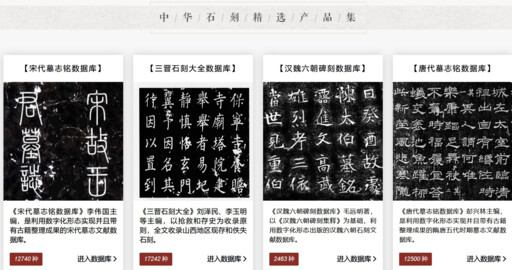


Folk documents facilitate study of Chinese legal history

FILE PHOTO: Collections of stone inscriptions provided by the China Stone Inscription Database.
In China, folk documents refer to a wide range of historical texts produced and preserved by ordinary people, as opposed to official histories, local chronicles, and state archives. These include stone inscriptions, village chronicles, genealogy books, riyong leishu (encyclopedias for daily use), contracts, account books, personal letters and diaries, marriage certificates, funeral records, and more. As academic research has increasingly shifted from focusing solely on grand official narratives to placing greater emphasis on the everyday lives of ordinary people—lives that reveal both social order and major historical events—folk documents have garnered increasing scholarly attention. Incorporating these materials into the study of Chinese legal history not only expands the scope of the field but also influences its research paradigm.
Growing scholarly attention
In recent years, Chinese scholars have intensified their efforts in collecting and organizing folk documents, which can be grouped into five categories.
Folk contracts: Classified by region, folk contracts include Huizhou documents, Fujian civil contracts, Zhejiang civil contracts, documents from the Taihang Mountains, historical materials on Shanxi merchants, and salt industry contracts from various parts of Sichuan.
Folk stone inscriptions: A vast number of inscriptions have been discovered in Shanxi, Shaanxi, Shandong, Yunnan, Guangxi, and other regions. Corresponding databases have been established, such as “Database of Stone Inscription in Sanjin Area (Shanxi Province),” “Database of Stone Inscriptions of Han, Wei and Six Dynasties,” “Collection of Rubbings of Stone Inscription of Past Dynasties,” and “China Stone Inscription Database.”
Genealogy books: Rich in family information, genealogies serve as valuable supplements to official histories.
Encyclopedias for daily use: These books contain a variety of standardized texts essential for everyday life, collectively reflecting public needs during certain periods.
Personal letters and diaries: Several digital platforms have been established, such as “Full-Text Database for Modern and Contemporary Diaries,” “Chinese Biographical Database,” and “Document Platform of Late Qing and Republic of China.”
Significant research value
Folk documents possess distinctive research value. First, as materials created for practical purposes in daily life and production, they paint a relatively authentic, detailed, and comprehensive picture of ordinary people’s lives. Second, these documents often exhibit continuity and reflect household-specific characteristics, depicting long-term family development and individual experiences amid social changes. Third, while official texts were often subject to deliberate revision, additions, or omissions to align with ruling interests, folk documents can, to some extent, help fill historical gaps and assist researchers in uncovering historical truths.
Different types of folk documents serve varying functions in the study of Chinese legal history. First, encyclopedias for daily use are typically employed as supplementary sources to verify the occurrence of specific events. Second, studies of stone inscriptions are centered around hydraulic inscriptions and official document inscriptions. The former record disputes over water resources and their resolution processes, providing insights into the workings of ancient production systems. The latter trace how imperial edicts were conveyed to the local populace, illustrating the interface between the state and the public. Third, family rules mentioned in genealogy books represent important legal norms in private sphere, possessing high authority and stability. These illustrate the internal self-governance systems of families and their relationships with local and state governance structures. Fourth, the letters and diaries of notable figures reflect social interactions and the social order of their time. Fifth, research on folk contracts is shifting its focus from formal elements to legal relationships, social systems, and the role of specific groups within social structures.
Overcoming research limitations
Despite growing interest, several limitations remain in the study of Chinese legal history through folk documents. In terms of source diversity, current research still focuses heavily on contracts and genealogies, while other types of documents remain underexplored. This narrow focus has led to repetitive studies, hampering innovation and undermining the value of these works. Furthermore, many researchers concentrate on textual interpretation without considering the documents within broader social contexts. Methodologically, legal historians primarily adopt historical verification methods to examine folk documents, supplemented by legal case analysis, with relatively little attention given to theorization and analytical argumentation.
China boasts diverse and abundant folk documents with considerable potential for further preservation and research. To effectively utilize these documents in the study of Chinese legal history, scholars should adopt a more comprehensive approach—moving from textual verification to the presentation of legal and social realities, and ultimately to theoretical advancement, thereby highlighting China’s dynamic social order and institutional civilization.
He Liqiong is a lecturer from the Law School of at Inner Mongolia University.
Editor:Yu Hui
Copyright©2023 CSSN All Rights Reserved